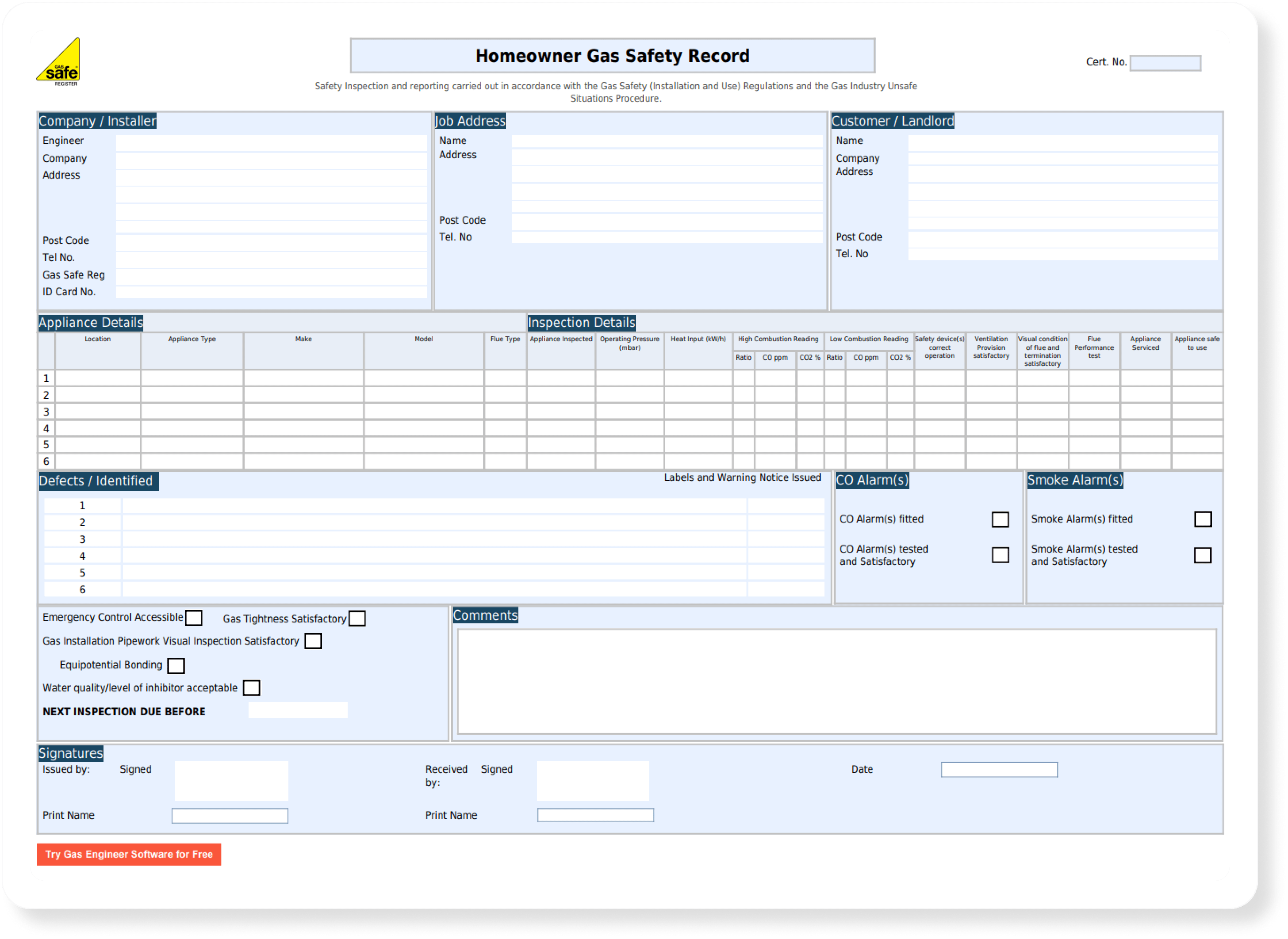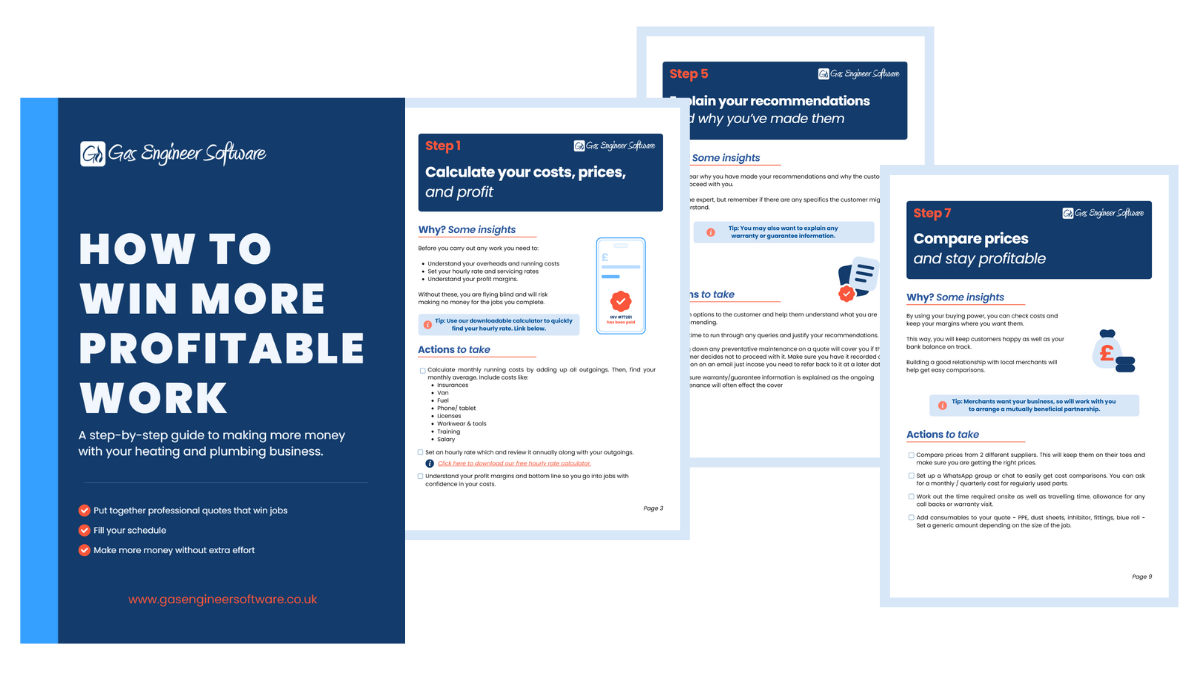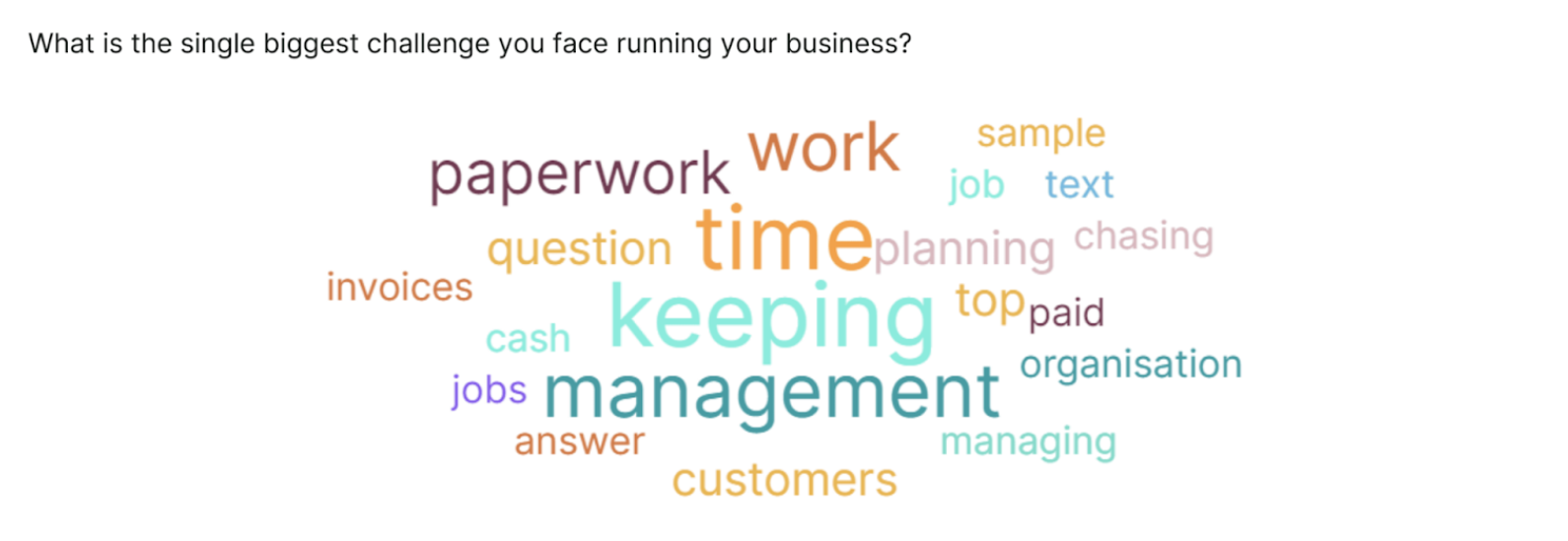From Paper To Software: The Gas Engineer 2023 Survey Report
![[Featured Image] Survey report](https://gasengineersoftware.co.uk/wp-content/uploads/2023/12/Featured-Image-Survey-report.png)
From Paper to Software: How The Gas Industry is Changing
We asked just under 100 heating and plumbing businesses about some of their greatest frustrations, how they’ve been using software, and the impacts of doing so.
The results provide an interesting insight into the role of software in a historically very traditional industry. Paper for a long time has reigned supreme – but heading into 2024 we’re seeing more and more businesses turn to software solutions as a way to save time and make more money.
The results of this report will help gas engineers understand where the industry sits, how businesses are using software, and what changes they could make to benefit their company.
But first, some of the highlights of the survey:
Key takeaways:
- A significant majority (67.7%) of those moving to software are coming from a paper-based management system.
- The industries greatest frustrations are paperwork, admin, data management, and a lack of time.
- Electronic certificates & records are the most used feature (according to 52.9% of respondents)
- 70.4% fully learn software within a week, 17% of which within a day.
- The average gas engineer spends 8.37 hours per week doing admin / paperwork for jobs and tasks.
- Data reports that gas engineers save an average of 6.6 hours per week by using job management software.
- Before software, 63.9% of gas engineers worked overtime for an average of 8.2 hours per week.
- After software, 54.2% of gas engineers work overtime with an average of 4 hours per week.
Where the industry sits
67.7% of the survey respondents said they were using paper before switching to Gas Engineer Software, with only 19.2% coming from another software.
This figure shows that despite software solutions becoming more common in the industry, a significant number of gas engineers still opt for paper. In the future, we would expect to see this number decrease, while the numbers coming from another software or using Gas Engineer Software since starting their business increase.
| Paper: | 67.7% |
| Other software: | 19.2% |
| Other (specified): | 8.1% |
| Messaging platforms like WhatsApp: | 4% |
| Job management not a priority: | 1% |
Key frustrations facing the industry
Among the biggest frustrations plaguing the industry are:
| Paperwork, admin & data management: | 24% |
| A lack of time: | 16% |
| Getting paid & chasing invoices: | 15% |
| Job management & scheduling: | 11% |
| Operational costs: | 10% |
| Staffing: | 8% |
Here’s a wordcloud which provides another way of looking at these results:
Key takeaways:
Admin work is a burden on the real work
It’s unsurprising that paperwork, admin & data management sit at the top, being a part of the job that can’t be skipped yet makes no money. A shared goal amongst every trades business is to reduce the amount of time spent on non-billable tasks so that they can either invest more time into the business or lead a healthier work-life balance. These tasks can be complex, mundane, and time-consuming.
In fact, the average gas engineers who responded to this survey said that they spend 8.37 hours per week managing jobs and tasks (individual figures ranged from 0 hours for those with admin staff, and up to 20 hours for some).
There isn’t enough time in the day
Especially in a competitive industry and during an ongoing cost of living crisis (in which inflation reached a 41-year high in October 2022), it makes sense that gas engineers feel tight on time. In addition to 16% labelling time constraints as a key frustration, many other frustrations like paperwork are directly linked.
When we asked what the two biggest non-billable time sinks are, two sat firmly at the top:
- Driving to customers (63%)
- Admin tasks (32%)
It’s interesting to note that even though almost twice the number of engineers reported travelling to customers as a bigger time sink, little can be done to avert it (aside from smart scheduling) and therefore isn’t such a notable business frustration.
How is software being used by gas engineering businesses?
For a significant portion of the industry, software has become an indispensable tool helping save time and generate more income. But each business has its own workflow: Some may have fully adopted software, others only partially, and some use several different pieces of software for different tasks.
We asked the survey respondents to rank software features by how much they use them:
- At the top of the list was electronic certificates & records
- Next came quotes & invoices
- Then scheduling & calendar
There are a few things we can learn from these results. Firstly, with certificates & records ranking so high, companies looking for software would be best advised to find a company that specialises in digital certificates.
Secondly, while 84% of companies using our software have automated reminders enabled, we expect few respondents placed automated reminders higher despite this because they are largely “set and forget”. Similarly, while electronic quotes & invoices are undoubtedly popular, there is considerable competition from non-industry specific software.
Additionally, automated reminders, job management, and customer relationship management all scored comparatively lower likely due to the fact they play a more background role in software. In particular, a customer relationship management platform is absolutely crucial for many of the other features which are highly-valued by gas engineers, and is more like the glue that holds everything together.
Lastly, scheduling seems to be a feature either used consistently throughout the day or not at all (in the case of companies that may still use paper scheduling, for example).
In fact, if we break down the responses according to the size of the company, we see that:
- Only 11.6% of sole traders placed scheduling as their most used feature;
- While 27.7% of larger companies did so.
This is likely because larger companies have a much higher tendency to use software for scheduling as it helps them better manage a large team. However, some sole traders stick to paper as it works for them.
- 1st: Certificates and records
- 2nd: Quotes and invoices
- 3rd: Scheduling and calendar
- 4th: Automated reminders
- 5th: Job management
- 6th: Customer relationship management (CRM)
How has software changed workflows?
With so many companies turning towards software for some if not all major aspects of their business, looking at how their workflow has changed provides valuable insight.
For companies considering making the jump, there can be a disjoint between
- Understanding the “features” and “benefits” of software;
- And understanding the real world impacts it might have on your business.
In other words, how is it going to change the way you work? This was one of the questions we asked in our survey:
| Less time spent on quotes and invoices: | 74.1% |
| Quick to find customer details when they call: | 70.7% |
| Started sending automated reminders: | 50.5% |
| Used to send reminders manually, now automated: | 38.2% |
| Scheduling is straightforward and organised: | 20.2 |
| Integrate with other software: | 14.6% |
How quickly is software picked up by engineers?
- 70.4% said within a week;
- With 17% of which saying taking less than a day.
Given the speed at which the majority of engineers are picking up software, even minor benefits could be considered worthwhile.
What benefits is software offering?
Based on the results we’ve seen from this survey, software has proven an integral part of the modern day heating and plumbing business. For those that want to remain competitive in their area and lead a work-life balance, software is almost a necessity.
Time saved
When we asked how much time software saves them each week, we saw a figure of 6.6 hours (on average, using all the responses we collected). This is close to one full working day each week – a substantial amount of time for many gas engineers.
Specific features that were voted to save the most time include:
| Records & certificates: | 50.6% |
| Quotes & invoices: | 20.2% |
| Job management: | 10.1% |
This comes as no surprise with the top two responses (totalling 70.8% of responses) being job-related paperwork – which represent and link back to a key frustration within the industry. These are all tasks that can’t be skipped, take time, and can be tricky to do manually.
Even if some features, like automated reminders, might save just as much time as any other feature, they’re not a compulsory part of the job. In other words, if not everyone was doing them before (only 38.2% used to send manual service reminders), then for many there is no real “time saved” – rather just a nice feature that brings in extra jobs.
Less overtime
Finding a proper work-life balance is always a struggle when you’re running your own business – especially in the trades industries. Paperwork, admin duties, marketing, and other ad hoc tasks often seep into evenings and weekends as engineers feel they don’t have enough time in the day after completing all their jobs.
When we asked whether engineers regularly spent time working after hours or on weekends before using our software:
- 63.9% said yes, with an average of 8.2 hours per week;
- 36.1% said no.
To most gas engineers, it will come as no surprise to hear that the majority work after hours. But what’s significant here is the length of time they spend doing so: over 8 hours on average, which means most are working a full 6 day work week.
To get an idea of software’s impact on this overtime, we asked the same question for after they adopted our software:
- 54.2% still said yes, but with an average of 4 hours;
- 45.8% said no.
Approximately 10% fewer gas engineers work overtime after adopting software into their workflow. While it’s a promising figure, viewing the question as a yes/no doesn’t show the full picture. With average overtime at 4 hours, gas engineers are spending half the time they were before using software.
Time reinvested
From what we’ve seen, software is undoubtedly helping gas engineers buy back some of their time.
But where is this time being reallocated to? Are gas engineers feeding this time back into their businesses to gain a competitive edge over their competitors? Or are they using it to claw back some of their free time and regain a work-life balance?
When we asked the survey respondents this question, here’s what we saw:
| Enjoying more personal or family time: | 51.9% |
| Completing more jobs (and therefore making more money): | 32.5% |
| Spending more time on each job (to improve service quality): | 9.6% |
The remaining few percent were spread across things like staff management, training, and administration.
Where “time is money”
We’ve all heard this saying – and it certainly rings true for gas engineers. Unlike employees, business owners are in control of their own workload. They’ve got to make the tough decision between extra work (and income) or free time – and ultimately finding a balance between the two.
Features like automated reminders (which was voted by 44.9% to be the most profitable feature) help gas engineers effortlessly get more work. But dig a bit deeper, and the true benefit is helping them spend their time wisely: rather than prioritising finding customers (which makes no money), they’re free to spend their time on billable jobs.
In other words, software with its time saving features has two core benefits:
- Enabling overworked gas engineers to find a better work-life balance.
- Helping engineers that want to make more money make better use of their time.
Constantly juggling so many tasks is an easy route to losing sight of the true prize and getting stressed. Using software to free up time has proven a great way to be more focused and productive while leaving more time for the family growing the business.
To close things off, we asked gas engineers what their biggest frustration that software solves is:
| Paperwork & data entry: | 24% |
| Customer management & reminders: | 15% |
| Organisation & record keeping: | 15% |
| Scheduling & job management: | 13% |
Here’s a wordcloud from the responses:

Looking forward to the future of the industry
As we head into 2024 and the industry continues to evolve, certain things are becoming clear.
Firstly, the role of software is becoming more prevalent. Younger gas engineers entering the trade have a much higher likelihood of using software (several of the responses indicate that software has been used from day 1), and more experienced engineers are getting on board with the idea.
Ultimately, it boils down to providing the best possible service for customers. Software enables engineering companies to be much more flexible, nimble, and efficient with their time. This means a higher quality of service, more availability for bookings, and much more personalised customer service.
Secondly, with the future of the wider UK gas industry uncertain, it makes sense for gas engineers to prepare for an eventual shift. Whether this means diversifying into other trades, getting new qualifications, or anything else – time is essential.
Next steps:
If you’ve been thinking about implementing software into your workflow to save time, here’s what you can do next:
- Visit our resources centre where you'll find more articles like this one and our free gas rate calculator.
- Start a free trial to see exactly how our software works for your business.
- Watch our video demo to get an idea of how our software works. You can also book a 1-on-1 session with our customer success team for a more personalised experience.
- Know an engineer who's still using paper? Help them and us out by sending our software their way!


